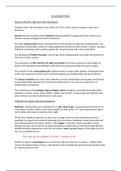Summary
Summary Edexcel Religion and Ethics A-Level - Situation Ethics Master Document
- Institution
- PEARSON (PEARSON)
A summary of the Edexcel Zig-Zag guide to religion and ethics within the religious studies A-Level, organised by the specification to ensure that all areas are covered. Includes scholars' quotes and the basic knowledge of the situation ethics topic. Got an A in A-Level religious studies.
[Show more]



